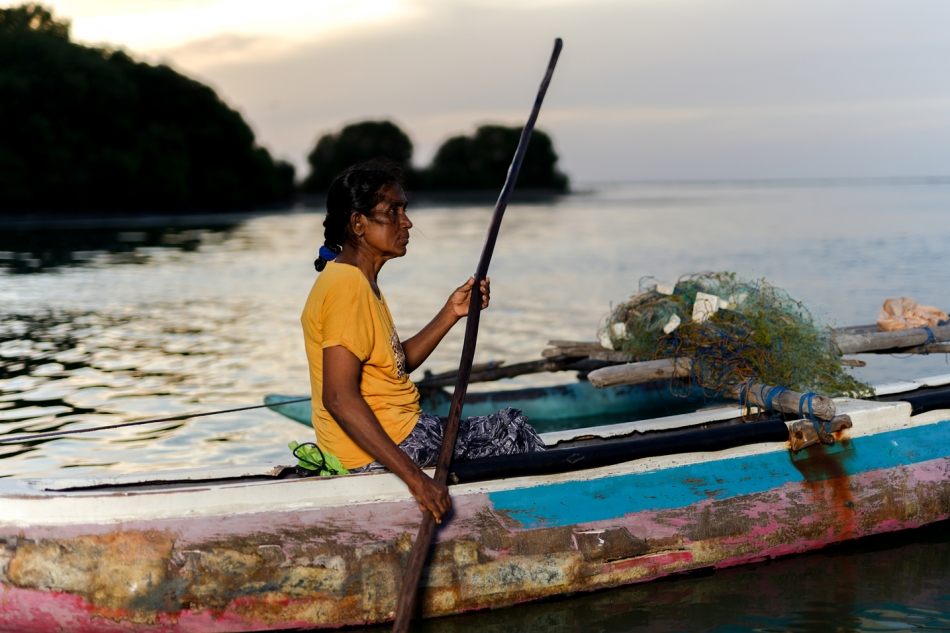
Susila Kanthi is one of the few active fisherwomen working in one of Sri Lanka’s biggest fishing districts. After 27 years in the trade, she has garnered respect and support from her community. ©FAO/Roar Media
In the fishing trade for nearly 27 years, Susila Kanthi, now 57 years old, is still one of the few active fisherwomen working in one of Sri Lanka’s biggest fishing districts. As it requires a lot of time away from the home and family, fishing was traditionally viewed as a man’s job.
“I am the only woman engaged in the fishing industry in Palaviya. There are other women who can drive boats, but they do not go fishing,” says Kanthi.
On a largely barren piece of land in Puttalam, Kanthi’s house borders an extensive salt production factory on one side and a vast lagoon on the other. Every Saturday evening, she gathers her net and oar and sets out to fish on the Puttalam lagoon. She returns home only the next morning, hauling her catch from the night.
Kanthi first became involved in fishing with her husband. He was an amputee and required support to fish.
“I used to go fishing when my husband was alive and was trained by him, so I continued the trade.”
When her husband passed away five years ago, Kanthi became the main breadwinner of her family, supporting her bedridden mother, daughter, granddaughter, grandson and son-in-law, who is also a fisherman but whose income alone can’t sustain the family.
To attend to her mother’s rising medical expenses, Kanthi took up work at a prominent saltern near her home. With vast salt fields in her backyard, she is no stranger to the workings of the salt industry. Kanthi’s main role is maintaining the salt pans and harvesting the crystals as they form.
Her real passion, however, is fishing. Kanthi is most proud of her hard-earned skills and experience as a fisherwoman.
“I like this livelihood. If not for my mother’s expenses, my earnings from fishing would be enough,” she says.

In the wake of the COVID-19 pandemic and related lockdowns, Sri Lanka slipped into a socio-economic crisis that threatened the food security of 6.3 million of its people and the livelihoods of vulnerable farmers and fishers across the country. By 2022, the crisis had severely affected the livelihoods of those engaged in the fishing trade and Kanthi was no exception. The widespread fuel shortages and increased cost of fuel and fishing nets made it uneconomical to fish.
“During those six months, there was no way to engage in fishing, and there were times that we had only one meal,” Kanthi relates.
The saltern she worked at also halted operations due to the shortages of fuel, gas and electricity leaving her with little to no income.
During this period the Food and Agriculture Organization of the United Nations (FAO), with funding from the United Kingdom’s Foreign, Commonwealth and Development Office (FCDO), provided emergency cash assistance to over 5,000 small-scale fishers in nine of the most impoverished fisheries districts. Kanthi received three cash transfers during this challenging period. She used the funds to fulfil her day-to-day household needs as well as cover her mother’s medical expenses.
These emergency cash transfers were a lifeline when her round-the-clock work and two jobs stopped providing her the income she and her family needed to get by.
“My mother is a great example for other women,” says Kanthi’s 26-year-old daughter, Malithi. “She is stronger than most people. It was she who worked day and night when we were young to fulfil all our needs.”
While cash transfers helped address their most pressing needs, promoting gender equality to reduce the inordinate work burden on women is also one of FAO’s larger aims.

Today, Kanthi is back to her routine. The saltern she works at is operating regularly again, and the price of fuel and other essentials, although still higher than pre-crisis levels, have stabilised. Her days now consist of hours spent on the Puttalam waters, production work at the saltern and caring for her tight-knit family.
Although her challenges may be far from over, she is certain about continuing her occupation as a fisherwoman even as she grows older. She has plans for her fishing and salt-working income.
“My hope is to finish building our house and live here with my daughter and her children.”
Together with its partners, FAO said it is addressing urgent food security needs through cash assistance, helping families meet their needs and restart their livelihoods in the most affected districts of Sri Lanka.
Source: the FAO News and Media office, Rome
– global bihari bureau





